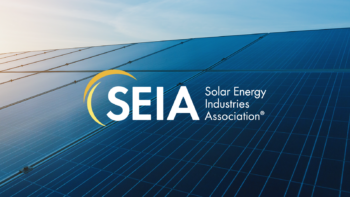As Debt Ceiling Negotiations Continue, Renewable Groups Urge Congress to Enact Bipartisan Transmission Permitting Legislation
WASHINGTON, D.C. – With permitting reform discussions occurring in Congress this week and debt ceiling negotiations continuing, leading national renewable energy organizations sent a letter to House and Senate leadership urging the enactment of bipartisan transmission permitting legislation that builds on the transformational clean energy policies included in the Inflation Reduction Act.
“Research shows that we will need to double the pace of historical transmission deployment in order to maximize the carbon emission reduction benefits of this historic legislation,” the groups explain in the letter. “These reforms are essential to realization of the 21st century transmission grid America needs to bolster economic competitiveness, ensure grid reliability in the face of increasingly frequent severe weather, and achieve the clean energy transition necessary to address the climate crisis.”
The American Council on Renewable Energy (ACORE), Advanced Energy United (United), and the Solar Energy Industries Association (SEIA) recommend reforms to the Federal Power Act that:
- Enhance the Federal Energy Regulatory Commission’s (FERC) siting authority over critical interstate transmission lines;
- Codify fair cost allocation language that allows transmission developers to recoup the costs of interregional lines from those who benefit, and allow for related petitioning to FERC;
- Improve interregional planning processes to better reflect the multiple benefits of an interconnected grid; and
- Direct FERC to implement an interregional transfer capability requirement to ensure that adjacent transmission planning regions are able to transfer electricity during times of stress on the grid.
The renewable energy organizations also urge Congress to consider policies that modernize National Environmental Policy Act (NEPA) reviews while maintaining bedrock environmental protections. These include reforms that:
- Prioritize upfront and meaningful stakeholder consultation, particularly with underserved communities
- Provide reasonable timelines for Environmental Impact Statements and Environmental Assessments
- Mandate designation of a lead agency to be responsible for a single environmental document
- Establish a reasonable statute of limitations for judicial review
- Provide sufficient resourcing for permitting agencies
Any negotiated framework that addresses environmental reviews must also include requisite transmission siting and permitting reform, the groups added, noting opposition to any effort to decouple these two important topics.
Click here to download a copy of the letter.
###
About SEIA®:
The Solar Energy Industries Association® (SEIA) is leading the transformation to a clean energy economy, creating the framework for solar to achieve 30% of U.S. electricity generation by 2030. SEIA works with its 1,000 member companies and other strategic partners to fight for policies that create jobs in every community and shape fair market rules that promote competition and the growth of reliable, low-cost solar power. Founded in 1974, SEIA is the national trade association for the solar and solar + storage industries, building a comprehensive vision for the Solar+ Decade through research, education and advocacy. Visit SEIA online at www.seia.org and follow @SEIA on Twitter, LinkedIn and Instagram.
Media Contact:
Jen Bristol, SEIA’s Senior Director of Communications, jbristol@seia.org (202) 556-2886



